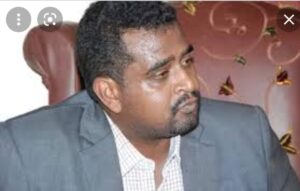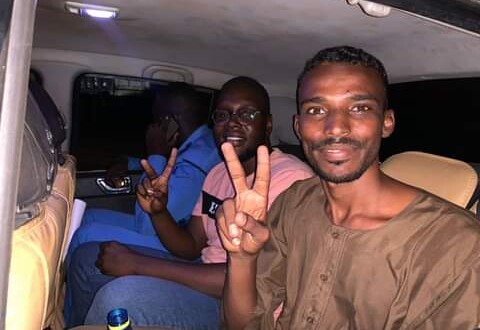The government of Sudan has been urged to respect its citizens’ right to freedom of expression, association, and peaceful assembly.
In a statement issued on September 27, 2021, the African Centre for Justice and Peace Studies (ACJPS) expressed concern about the wellbeing of journalist Otaf Abdelwahab Altom, the director of Al-Naba Centre for Press Services, who was arrested from his home and taken to Al-Mugran police station in Khartoum on September 22, 2021.

He was charged with undermining the constitutional system and waging war against the state. Both charges carry a penalty of death or life in prison. ACJPS said Altom’s family had not been able to visit him and that they did not know where he was being detained.
The non-governmental organisation, which monitors and promotes respect for human rights and legal reform in Sudan, urged the authorities to guarantee the journalist’s safety and well-being, and grant him access to his lawyers and family members.
It also asked the government to promptly bring him before an impartial, independent, and competent tribunal and guarantee his procedural rights.
Earlier, ACJPS had complained about the charges levelled against journalist and human rights defender Aisha Al-Majidi and civic rights activists Musab Zakaria and Suleiman Jamal.
Al-Majidi was charged with defamation based on a Facebook post criticising the Rapid Support Forces (RSF), while Zakaria and Jamal are facing charges of disturbing the public peace and being a public nuisance, charges that carry a penalty of three months’ imprisonment, a fine, or up to 20 lashes of the whip.
In a statement, the organisation said Al-Majidi was arrested on September 15, 2021, after the RSF and the Committee for the Removal of Empowerment of the Previous Regime filed two separate cases against her. She was released on September 16, with the case against her pending.
“In early September, Al-Majidi published an article on her Facebook account where she called on the authorities to merge the Rapid Support Forces with the Sudanese Armed Forces. A direct translation of the Facebook post reads as follows, ‘The Rapid Support Forces must be dissolved because they are not useful and there is no need for them in the first place, and they are of a very high cost to the state budget, such as in the payment of salaries, incentives, vehicles, and rents for buildings. There is no country in which two armies are useful!! The demobilisation of the Rapid Support Forces is a necessity required by the sovereignty of the state. The Rapid Support barracks should be transformed into hospitals, childcare homes, orphanages, and so on’,” said the statement.
 A Sudanese female human right defender faces “defamation” charges for criticising the Rapid Support Forces on Facebook. Photo Credit: @ACJPS
A Sudanese female human right defender faces “defamation” charges for criticising the Rapid Support Forces on Facebook. Photo Credit: @ACJPS
The day before she had published an article criticising the Committee for the Removal of Empowerment of the Previous Regime, accusing it of causing the citizens injustice and pain.
According to the NGO, Zakaria, 19, and 25-year-old Jamal were arrested on September 11, 2021, by members of the Rapid Support Forces in a mosque in the Umbada neighbourhood in Omdurman city as they protested against Sovereign Council Vice-President and Commander-in-Chief of RSF, General Mohammed Hamdan Dagalo, who was in the mosque. They were demanding justice and accountability for the crimes they claimed the military unit had committed against the civilian population.
ACJPS claimed that the charges had been filed despite the fact that there was no criminal complaint or witness.
“On September 12, investigations were completed as a police officer showed up as a complainant. He was heard and thereafter, the activists were released on bail,” said the statement.
According to ACJPS, the use of repressive laws to try to stifle freedom of expression, association, and assembly are not new to Sudan. Under the leadership of deposed former President Omar Al Bashir, the country was known for violating its citizens’ rights through detention and prosecution of peaceful protesters “for malicious and fabricated charges”.
The RSF is a powerful military force in Sudan and it has been accused of using force to suppress citizens.
ACJPS said Sudanese citizens are increasingly using social media platforms to voice their concerns over the governance of their country. Online platforms have become popular as an alternative to traditional media outlets such as newspapers, which are heavily censored and repressed.
It called for justice and accountability for the crimes the RSF has been accused of and urged the Sudanese authorities to drop all the court cases against all journalists and human rights defenders detained on what it characterised as “trumped-up charges”.
ACJPS recalled that in 2019, it documented the detention of several human rights defenders and activists suspected of participating in peaceful protests. In October 2020, the organisation said five artists were charged with disturbance of the public peace and being a public nuisance for chanting revolutionary slogans inside jail cells.
It urged the Sudanese authorities to respect and guarantee the right to freedom of expression, as provided for in Article 56 of the Constitutional Declaration of 2019, and international and regional human rights treaties that Sudan is a party to.
ACJPS also asked the government to instruct its law enforcement agencies to stop harassing and intimidating individuals who were exercising their rights legitimately.
The organisation proposed that the country undertake law reform to adhere to the regional and international standards to which Sudan has committed itself, including the African Charter on Human and Peoples’ Rights and the International Covenant on Civil and Political Rights.
- This article has been updated to include the case of Otaf Abdelwahab Altom







